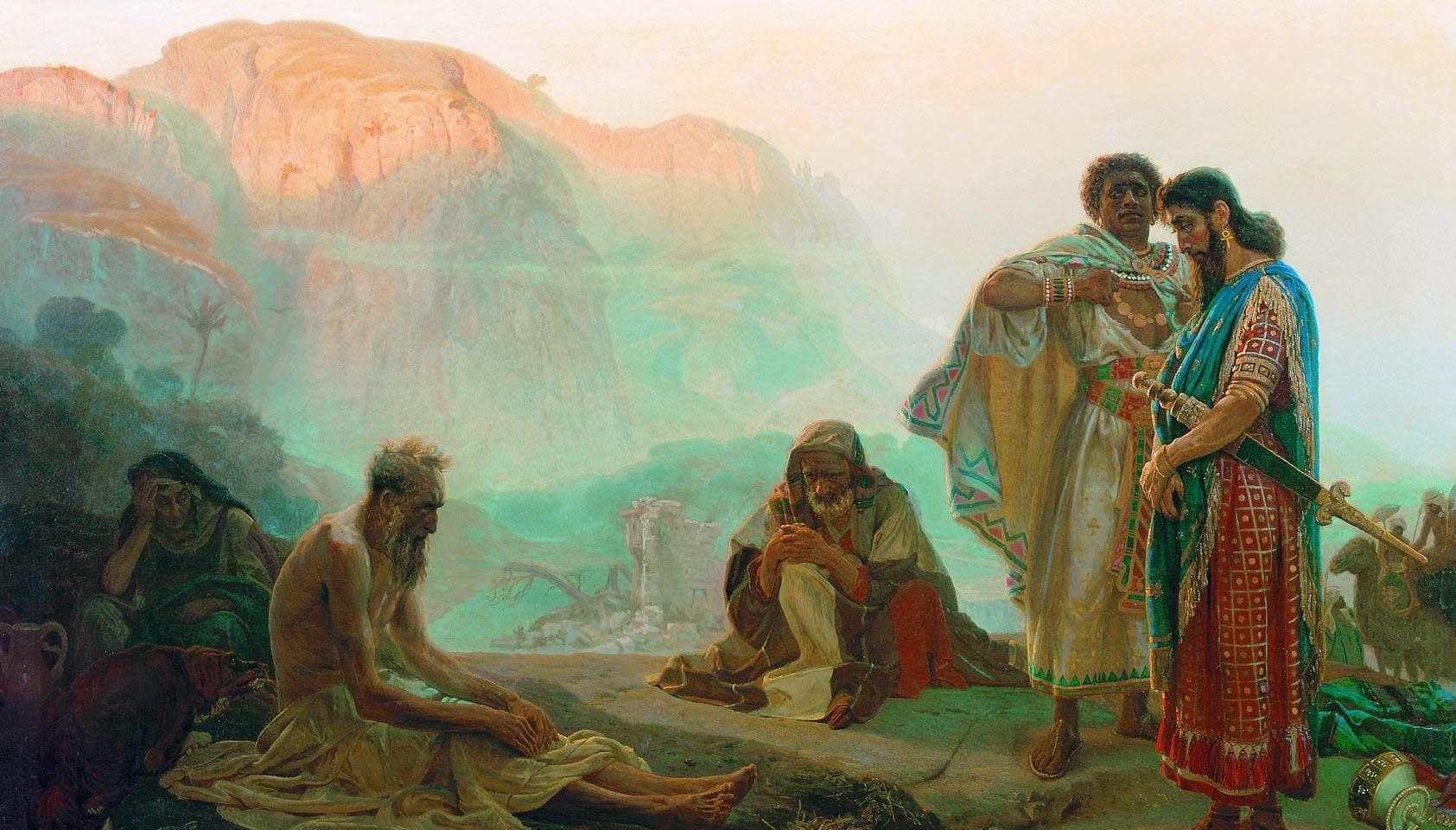Q:
“Dear family: my wife and I, in this fifth time through the bible in one year under your tutorship, we gladly inform you of how much we love, enjoy your teaching. Thank you! God bless you and this ministry. I personally, have a question that I would like to ask you pertaining “Pious Job”. We hear from so many pastors, Job’s life time fits in the slot between Noah’s days to the days of Abraham. If so, how do we reconcile what we read in 1 Chronicles 2:4-9, where we have a list of the sons of Judah, which it leads to the name Ram. Judah, fathered Perez – Perez, fathered Hezron – Hezron, fathered Ram. This is the list of Abraham’s descendants: Isaac, Jacob, Judah, Perez, Hezron, Ram. In Genesis 22:20-21, we have Abraham’s brother Nahor. This Nahor fathered two sons named Huz and Buz. This Buz fathered the Buzites family. (I believe, please correct me if I’m wrong) In Job 32:2 we have Elihu a Buzite of the kindred of Ram. Thus this Elihu is a descendent of Abraham and Nahor. Isaac married Rebekah. Rebekah was the granddaughter of Nahor (Abraham’s brother) from Isaac and Rebekah’s descendants, we arrive to Ram related to Buz from which Elihu is a descendant. Therefore, I conclude Job’s timetable, is long after the time of the Patriarchs: Abraham, Isaac, Jacob and his twelve sons, which form the twelve tribes of Israel. Please teach us. Thank you!”
Frank & Helen B.
Thank you so much for your kind words! In all honesty, this is a tough one. I think it’s very possible that Job lived after Abraham. The historical Job is notoriously difficult to date. In fact, there is no consensus among scholars on his exact lifetime or when the book itself was finalized. So, I can’t give you a definitive answer, but we can have fun speculating. Here’s what I know so far:
The Historical Job
First off, in regard to your point on 1 Chronicles 2:4-9, it is not uncommon for different people to have the same name from different time periods, so this could be a different Ram altogether. Consider the use of the name Elihu (1 Samuel 1:1; 1 Chronicles 12:20, 26:7; 27:18), the name Buz (Genesis 22:20-22; 1 Chronicles 5:14), as well as King Saul and Saul of Tarsus (Paul). So, names alone are insufficient to establish a proper timeline; it’s better to cross-reference cultural factors.
Second, most traditional scholars who try to pin Job somewhere after the Flood and just before Abraham have legitimate historical reasons such as: Job’s elongated lifespan of 140 years which is similar to the lifespan of patriarchs before Abraham (Job 42:16); Job received qesitah which was a unit of money supposedly used during the patriarchal timeframe (Job 42:11); Job’s material wealth was determined by flock size rather than money (Job 1:3; 42:12); he was the only righteous man on earth at the time which seems to indicate it was sometime before Abraham, Moses and the Prophets (Job 1:8); also consider that Job was still offering burnt sacrifices in the same way as the early patriarchs and before, where the head of the household would atone for the whole family (Job 1:5); most of the literary themes are about early creation, including God’s judgment; finally, there is no mention or allusion to the Abrahamic Covenant, Israel (Jacob) or the Mosaic Law anywhere, which would be extremely peculiar, if not improbable, for an ancient Hebrew prophet to write/compile the book of Job as a righteous person apart from the Covenant or Law, especially during God’s response to Job (Job 38-41). After all, God made a covenant with Abraham and pulled him out of the land of Ur of the Chaldeans – not Job – and his faith was credited to him as righteousness. It would be odd, then, if Job was around in his lifetime or afterward.
Personally, I think these are all viable, compelling arguments to believe the historical Job lived before Moses at the very least as opposed to his contemporary or long afterward, and even possibly before Abraham and the patriarchal timeframe.
All that to say, it does not mean that Job could not have lived after Abraham and before Moses necessarily, say, sometime between Joseph and Moses when no other righteous man or prophet was alive, as you are suggesting. It is widely considered a credible view. Here are some points in your favour: First, it does seem odd to mention the family of Ram at all instead of just keeping his name Elihu “the son of Barachel the Buzite”, especially when Ram is in the line of David. Second, Job comes from the land of Uz, which is believed to be inside or just below Edom. Edom is a sister-kingdom of Moab where Ram descends from (Ruth 4:18-22). So, there is a connection here, the full extent of which is worth exploring.
When was the book of Job written?
Authorship plays a major role in dating methods. Although claims to its origin, date and authorship are unknown and variations of the story are scattered throughout ancient folklore and tradition from Egypt to Babylon, majority of scholars either (a) place its final form somewhere between the seventh and fourth century BC, during the return from the Babylonian Exile, (b) consider King Solomon a tenable final author/editor, or (c) cite rabbinic tradition and credit Moses as author assuming the book was composed or accumulated during his time in Midian (especially because the land of Uz is typically placed below the territory of Edom, closer to Midian).
Admittedly, the Talmud is not the most reliable source. Practically on the same page, it places the historical Job in three different places: (1) Job returned from the Babylonian Exile in 538 BC, which would align with modern scholarship but contradict Ezekiel’s chronology (Ezekiel 14:14), if it’s supposed to be in chronological order, because it would date Job before the Babylonian Exile; (2) Job lived sometime before or in the lifetime of Moses as mentioned earlier; (3) Job was a contemporary of Abraham, Isaac or Jacob. Then again, it also suggests that Job is not a historical, but allegorical – as you can tell, it’s quite the mixed bag! Interestingly, (2) and (3) are not mutually exclusive and carry the most historical weight as mentioned above, even in support of the Joseph-to-Moses view.
The book’s language is also heavily archaic, using peculiar variations and atypical Hebrew words. It also seems to be influenced by Aramaic, like the language used in the book of Daniel. This in mind; it seems to be a mix of ancient Near Eastern influence. On the same note, some scholars who will use Elihu as a great example of interpolation, simply because he seems to have been plopped into the text ad hoc or after the fact. Take notice that there is no mention of him before he speaks or after he speaks, not even in God’s judgment against Job’s friends. So Elihu might not be the best reference to date the historical Job, but it might prove useful in dating the books original composition and final form.
Conclusion
Ultimately, I do not think there’s reason to doubt Moses as the original author/compiler, but I do think it’s also possible that Elihu was added into the text at a later date by a prophet of God. Though, I’m not completely sure, 1 Chronicles 2:4-9 is fairly suggestive of it. It’s even possible that King Solomon added Elihu into the text in response to contemporary matters in his life, or even one of the prophets during the sometime after the Babylonian Exile, say, Ezra; but this is purely speculation. If this is the case, then, the traditional view still holds up: the historical Job could have lived before Abraham, oral tradition was then passed along to Moses when he was a shepherd in Midian and he later compiled the original story into its written Hebrew form during the wilderness wandering, and then possible additions were added to the text, such as Elihu, at a later date by a prophet. But like I said, I’m still only scratching the surface! And there’s a tremendous amount of data to consider when creating historical timelines.
Anyways, I’m sorry I couldn’t give you a straight answer. I hope it still helps –– God bless guys!

Matlock Bobechko is the Chief Operating/Creative Officer of Bible Discovery. He is an eclectic Christian thinker and writer, award-winning screenwriter and short filmmaker. He writes a blog on theology, apologetics, and philosophy called Meet Me at the Oak. He is also an Elder at his local church.







Good day my good teachers I believe all is well with you
I have a question concerning the book of Mormon, I was wondering whether you do have a knowledge about the book and how it apparently completes the Bible that’s what I heard, but it will be a great pleasure to know and understand about the adding and removing of scriptures in the Bible, I wanna know that does the book of Mormon add in the Bible
I am not sure where you’re getting your info, but great topic.